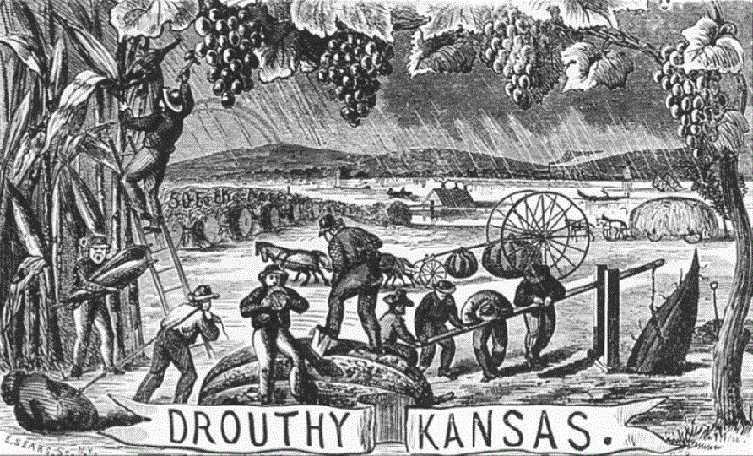
Causation Why Did People Go West?

Introduction
This spread looks at the reasons WHY people moved west.
After you have studied this webpage, answer the question sheet by clicking on the 'Time to Work' icon at the top of the page.
Links:
The following websites will help you research further:
Some reasons: BBC Bitesize
An important webpage on 'Manifest Destiny'
![]()
1: The Myth of the Plains
The government paid the railroad builders in land, and the railroad companies made their money by selling it to settlers. So they advertised the West as a place of plenty.
The Myth of the Plains was drawn by the Kansas vine-grower and artist Henry Worrall to contradict claims that Kansas was a place of drought his painting shows farmers harvesting huge grapes, melons, maize, pumpkins and parsnips. It was used in railroad company pamphlets and became: the biggest single advertisement Kansas had ever had. This is an engraving of his painting:

2: Going West
This source is taken from a hand-written copy of an article in a Kansas newspaper of about 1890. It tells us how a young man named ET McFarland went west to Kansas, where he worked as a railroad builder, and as a fur trapper, until he settled down as a singing teacher:
During the month of March 1865, I read an advert sent out by the UPR Railroad Co. who at that time was owner of a large tract of land covering a belt of country long known as the plains or desert of America. This advert described the country as a fertile region with streams of clear running water and belts of timber enough for all purposes. A land of rich grass, beautiful flowers, a nice climate and a healthy breeze where the lame were made to walk and the blind to see.
So taking Horace Greeley's advice to Go West Young Man I was not long in getting two other young men whom I will call John and Ed who like myself, wanted to go west to grow up with the country. Ed simply wanted to travel, while John, who had a relative in Kansas, wanted to come and see him and also take a claim as he called it. For myself, I did not know what I wanted, I had no more idea what a prairie looked like than a Kickapoo Indian would know about a steamboat.
3: Some Comments from the Time
A:
I have never regretted the moment I left Missouri and were I there again I would not remain there long. But I would set off for the Land of Glittering Dreams.
B:
As we could not mix with our neighbours in their midnight parties, Sabbath-breaking, horse-racing and gambling, they began first to mock us and then to attack us. Finally, a mob gathered and drove us from our homes.
C:
In a climate so mild that horses, cattle, and sheep and goats can live in the open air through all the winter months, and fatten on the dry and apparently withered grasses of the soil, there would appear to be scarcely a limit to the number that could be raised.
D:
Well, my people, for the want of land we needed land for our children and their disadvantages that caused my heart to hurt and sorrow. I sent out there perhaps in '66 perhaps so; and they brought back quite good reports; then I jacked up three or four hundred dollars, and went into Kansas and bought about a thousand acres of ground.